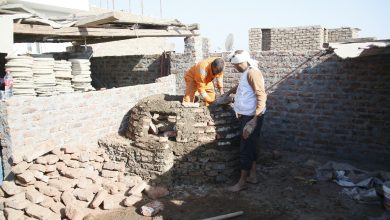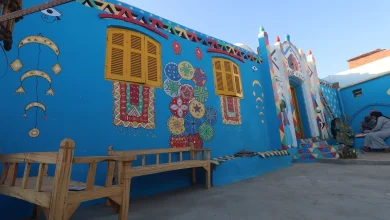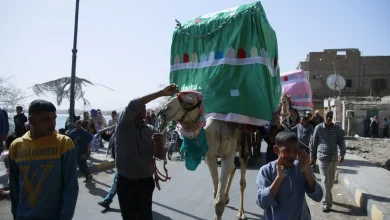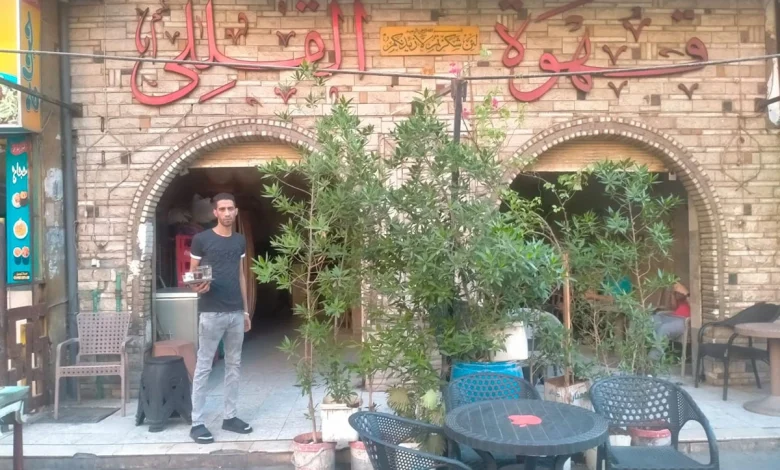
Al-Qulali Café… A cultural hub that brings together writers and intellectuals in Fayoum
Al-Qulali Café, located a few steps away from the Fayoum Cultural Palace, which has been closed for nearly five years for renovation, has become a haven for the province’s intellectuals and writers. Faced with this reality, the Cultural Palaces Authority has been forced to organize some cultural activities at the café, such as Ramadan nights and numerous seminars.
Al-Qulali Café: a destination for writers and intellectuals
Al-Qulali Café resembles the cafés of Al-Harafish in the novels of the world-renowned writer Naguib Mahfouz. It brings together a diverse mix of simple folk, hard workers, the unemployed, dervishes, students, writers, and intellectuals. Each of them has their own world.
This traditional café has contributed to preserving the literary and intellectual identity of Fayoum’s intellectuals for decades. Its antique tables have witnessed dozens of literary and poetry evenings, especially after the closure of the Palace of Culture, which was the official window to the city’s cultural scene.
Al-Qulali, the big house of writers
Ahmed Al-Fouli, one of the café’s owners and the grandson of its founder, says: “Al-Qulali Café was established in 1948, when my grandfather, Hajj Abd al-Fattah al-Qulali, decided to emigrate from Qena Governorate and settle in Fayoum.”
He opened the café on Al-Warsha Street, opposite the train station, and then my father, Al-Maalim Al-Fouli Al-Qulali, inherited the café and the profession from him. Al-Fouli explains that the relationship between the café and the writers of Fayoum began with the establishment of the Palace of Culture next door.
His father became one of the palace’s regulars, attracted by the continuous cultural activity there. This led him to suggest organizing literary seminars and evenings inside the café to introduce customers to Fayoum’s writers and poets. He adds, “Al-Qulali was the first café to organize such events, and it became the favorite of most of Fayoum’s intellectuals.”
Memories and a lasting presence
Al-Fouli emphasizes that many writers and artists have fond memories of the café. Among them are the great colloquial poets Abdel Karim Abdel Hamid and Mohamed Hassani Ibrahim, and the composer Ahdi Shaker, who used to participate in Ramadan evenings. In addition to the late poet Mohamed Abdel Muti.
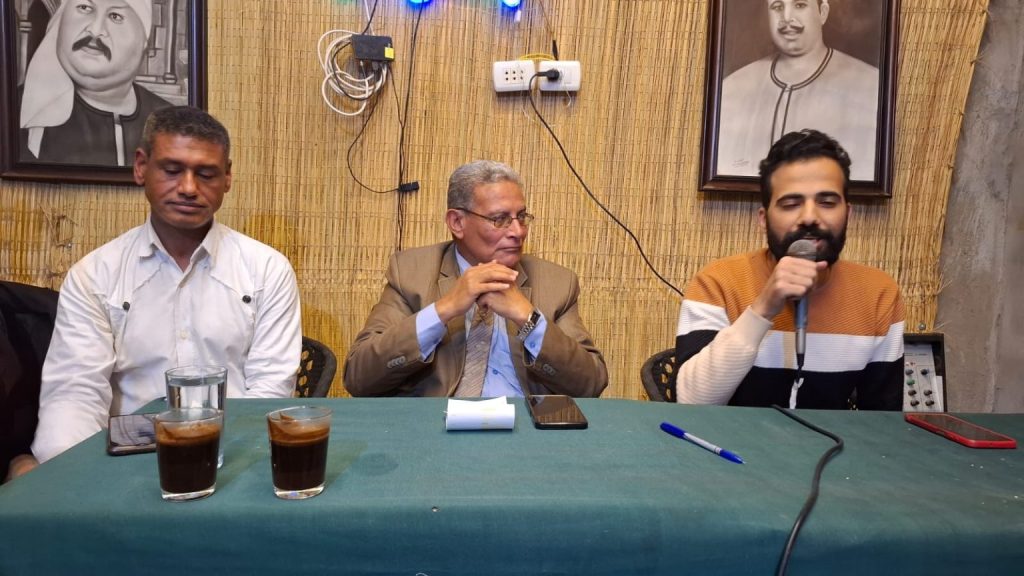
Raising the awareness of café visitors
Al-Fouli believes that these evenings have contributed to raising the awareness of café visitors. Many are keen to attend and enjoy the singing of local artists such as Ahd Shaker, Ahmed Saleh, and Hassan Zaki. He emphasizes that the café will remain connected to intellectuals and that he seeks to pass on this love to his son, just as he inherited it from his father.
Memories and friendships
Abdul Karim Abdul Hamid, the dean of colloquial poets in Fayoum, used to sit at Al-Qulali Café for many years. He would write his poems on pieces of paper on an old wooden table. He says, “Most of my memories with my writer friends are connected to the café. Our meetings were no longer limited to culture, but expanded to include friendly conversations, until many of the customers became close friends.”
The absence of official cultural institutions
Poet Mohamed Hosni Ibrahim believes that the gathering of writers at Al-Qulali Café is a form of resistance to the absence of official cultural institutions, especially after the closure of the Palace of Culture on the pretext of development. The café has become a place for continuing literary dialogues and hosting guests from the governorate. He adds that Al-Qulali is similar to famous writers’ cafés such as Rish, Al-Bustan, and Al-Borsa in Cairo.
The decline of the cultural role of Fayoum writers
In contrast, novelist Mohamed Jamal al-Din believes that the cultural role of Fayoum writers has declined and their influence has weakened. Their presence has become confined to a closed circle that does not extend beyond the boundaries of Al-Qulali Café. He adds: “I believe that the downsizing of cultural institutions, or the weak understanding of those in charge of them, has reduced creativity to a mere activity in which the employee is only required to prepare and equip the place. Without accompanying enthusiasm, the institution loses much of its cultural impact.”
Jamal al-Din points out that resorting to Al-Qulali has become a temporary solution with little return, given the changing nature of the audience in the last decade, as well as the shrinking space of the café and the unsuitability of the added section. He emphasizes that the creators did not intentionally create these closed circles. However, the circumstances imposed by reality led to this.
The unregulated alternative to cultural institutions
Poet Osama Sanad fears that cafés, such as Al-Qulali, will become an unregulated and populist alternative to cultural and literary institutions, especially in light of the closure of many cultural palaces. He says: Cafés have always had a cultural role since the days of the Rababa poets. People would gather around the poet to listen to the stories and epics of Salama bin Rizq, Diab bin Ghanem, and Al-Zanati Khalifa. That scene is over, but cafés remain a meeting point for different segments of society, including writers, authors, poets, and artists.”
He adds: “Although I believe that the role of cultural institutions has declined significantly, with the closure of a number of cultural palaces, foremost among them the Fayoum Cultural Palace, I do not consider cafés to be a real substitute for these institutions, even if they host some literary gatherings.”
Not like other cafés
Mohamed Abu Hadi, one of the café’s regulars, says: “The poetry and literary evenings held at Al-Qulali are one of its most distinctive features. I became attached to it because of its proximity to the Fayoum Cultural Palace. These evenings are extremely useful because they attract different age groups. Some families make a point of attending, especially during Ramadan.”
Abu Hadi continues: “For us, Al-Qulali is like El Sawy Culturewheel in Cairo. I heard about a proposal to set up a small library in one corner of the café, with a collection of books by writers and poets from Fayoum who frequent the café. But it hasn’t been implemented yet.”
The café supports writers
Sahar al-Gamal, head of public culture at the Fayoum Culture Branch, believes that the relationship between the cultural institution and Al-Qulali Café is very special, as writers and poets prefer to sit there, and it is also the place where they continue their conversations and discussions on various cultural issues while participating in events and seminars in the governorate.
Al-Gamal points out that what contributed to increasing the status of Al-Qulali Café was the love of culture and literature of its owner, Al-Hajj Fawli, and his continuous support for writers by providing a quiet atmosphere that helps them hold their seminars, and his refusal to receive any financial compensation in return. She concludes by saying: What Al-Qulali offered was the reason behind the adoption of the idea of a cultural café that gave writers, intellectuals, and politicians the opportunity to discuss their creations and ideas.

